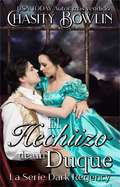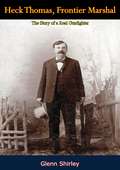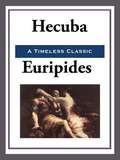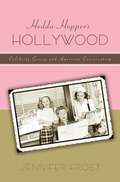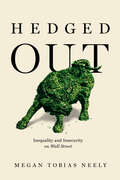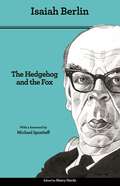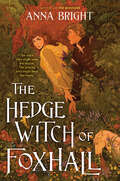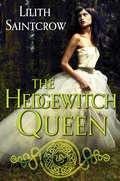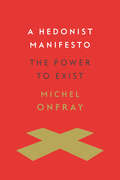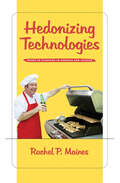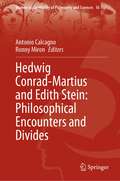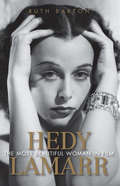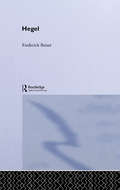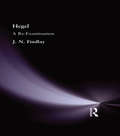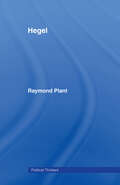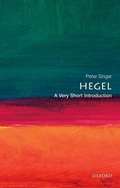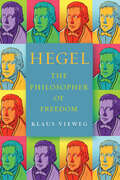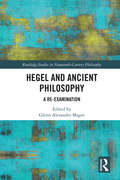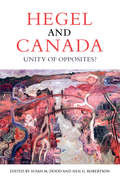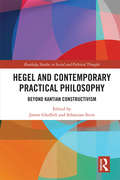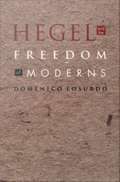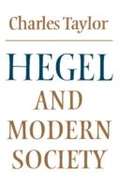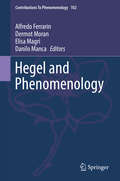- Table View
- List View
El Hechizo de un Duque (Serie Regencia Oscura/La Serie Dark Regency #1)
by Chasity BowlinComunicarse con los espíritus ha sido tanto un don como una maldición para Emme Walters. Ahora la ha convertido en el objetivo de un asesino. Emme sabe por qué la duquesa viuda de Briarleigh la invitó a una fiesta en casa para investigar si el duque Rhys Brammel asesinó a su esposa hace años. Pero Emme nunca imaginó que se enamoraría del duque. Marcado por la sociedad como un posible asesino, Rhys sospecha de Emme y su presunto "don." Entonces un encuentro nocturno crea conciencia de sus otros aspectos, más atractivos. Cuando la vida de Emme está amenazada, Rhys se convierte en su protector. Emme y Rhys encuentran pasión y peligro mientras unen fuerzas para resolver los misterios en Briarleigh. Ella le hizo creer en los espíritus, pero ¿puede hacerle creer en el amor?
Heck Thomas, Frontier Marshal: The Story of a Real Gunfighter
by Glenn ShirleyThe Old West bred some mighty tough men!Unfortunately, the general public knows little or nothing about the good ones!Billy the Kid, the Daltons, Jesse James, Sam Bass, the Youngsters, Wesley Hardin and many more are familiar as “heroes” to the children and their parents of today. So, even more unfortunately are many so-called “lawmen” who were actually nothing but hired killers, far more crooked than most of the men they eliminated!Heck Thomas deserves to be known in a way that most of the current TV “Marshals” never deserved. Fighter, yes, and killer at times, law officer of some of the toughest areas in the Southwest (such as the Cherokee Strip and other outlaw-ridden parts of Oklahoma), he never took a bribe, was a model family man, and lived to a magnificent old age, still “in hardness,” honoured as one of the last genuine heroes of the frontier by all who knew him. No one, outlaw or politician, ever made him back down and his record of arrests and captures still stands as one of the most noteworthy of any peace officer anywhere.To a public which always seeks true heroism and is proud of the iron men who built America, this man, Heck Thomas, must stand forever as the best type of man of the West, low-voiced, courteous, law-abiding, and very, very dangerous.Heck Thomas made his lifework keeping the law, and emerges from the shadowy past to blazing life as an authentic hero of the Old Frontier.
Hecuba
by EuripidesHecuba is a tragedy by Euripides written c. 424 BC. It takes place after the Trojan War, but before the Greeks have departed Troy (roughly the same time as The Trojan Women, another play by Euripides). The central figure is Hecuba, wife of King Priam, formerly Queen of the now-fallen city. It depicts Hecuba's grief over the death of her daughter Polyxena, and the revenge she takes for the murder of her youngest son Polydorus.
Hedda Hopper’s Hollywood: Celebrity Gossip and American Conservatism (American History and Culture #8)
by Jennifer FrostBefore Liz Smith and Perez Hilton became household names in the world of celebrity gossip, before Rush Limbaugh became the voice of conservatism, there was Hedda Hopper. In 1938, this 52-year-old struggling actress rose to fame and influence writing an incendiary gossip column, "Hedda Hopper's Hollywood," that appeared in the Los Angeles Times and other newspapers throughout Hollywood's golden age. Often eviscerating moviemakers and stars, her column earned her a nasty reputation in the film industry while winning a legion of some 32 million fans, whose avid support established her as the voice of small-town America. Yet Hopper sought not only to build her career as a gossip columnist but also to push her agenda of staunch moral and political conservatism, using her column to argue against U.S. entry into World War II, uphold traditional views of sex and marriage, defend racist roles for African Americans, and enthusiastically support the Hollywood blacklist.While usually dismissed as an eccentric crank, Jennifer Frost argues that Hopper has had a profound and lasting influence on popular and political culture and should be viewed as a pivotal popularizer of conservatism. The first book to explore Hopper's gossip career and the public's response to both her column and her politics, Hedda Hopper's Hollywood illustrates how the conservative gossip maven contributed mightily to the public understanding of film, while providing a platform for women to voice political views within a traditionally masculine public realm. Jennifer Frost builds the case that, as practiced by Hopper and her readers, Hollywood gossip shaped key developments in American movies and movie culture, newspaper journalism and conservative politics, along with the culture of gossip itself, all of which continue to play out today.
Hedge Funds, Systemic Risk, and Dodd-Frank: The Road Ahead
by Lloyd Dixon Noreen Clancy Krishna B. KumarThese proceedings summarize the key themes and issues raised during a symposium on September 24, 2012, hosted by the RAND Center for Corporate Ethics and Governance. Discussion focused on the ways in which hedge funds might contribute to systemic risk and the extent to which recent financial reforms address these potential risks. Participants included thought leaders from industry, government, and academia.
Hedged Out: Inequality and Insecurity on Wall Street
by Megan Tobias NeelyA former hedge fund worker takes an ethnographic approach to Wall Street to expose who wins, who loses, and why inequality endures. Who do you think of when you imagine a hedge fund manager? A greedy fraudster, a visionary entrepreneur, a wolf of Wall Street? These tropes capture the public imagination of a successful hedge fund manager. But behind the designer suits, helicopter commutes, and illicit pursuits are the everyday stories of people who work in the hedge fund industry—many of whom don’t realize they fall within the 1 percent that drives the divide between the richest and the rest. With Hedged Out, sociologist and former hedge fund analyst Megan Tobias Neely gives readers an outsider’s insider perspective on Wall Street and its enduring culture of inequality. Hedged Out dives into the upper echelons of Wall Street, where elite white masculinity is the standard measure for the capacity to manage risk and insecurity. Facing an unpredictable and risky stock market, hedge fund workers protect their interests by working long hours and building tight-knit networks with people who look and behave like them. Using ethnographic vignettes and her own industry experience, Neely showcases the voices of managers and other workers to illustrate how this industry of politically mobilized elites excludes people on the basis of race, class, and gender. Neely shows how this system of elite power and privilege not only sustains itself but builds over time as the beneficiaries concentrate their resources. Hedged Out explains why the hedge fund industry generates extreme wealth, why mostly white men benefit, and why reforming Wall Street will create a more equal society.
The Hedgehog and the Fox: An Essay on Tolstoy's View of History - Second Edition
by Isaiah Berlin"The fox knows many things, but the hedgehog knows one big thing." This ancient Greek aphorism, preserved in a fragment from the poet Archilochus, describes the central thesis of Isaiah Berlin's masterly essay on Leo Tolstoy and the philosophy of history, the subject of the epilogue to War and Peace. Although there have been many interpretations of the adage, Berlin uses it to mark a fundamental distinction between human beings who are fascinated by the infinite variety of things and those who relate everything to a central, all-embracing system. Applied to Tolstoy, the saying illuminates a paradox that helps explain his philosophy of history: Tolstoy was a fox, but believed in being a hedgehog. One of Berlin's most celebrated works, this extraordinary essay offers profound insights about Tolstoy, historical understanding, and human psychology.This new edition features a revised text that supplants all previous versions, English translations of the many passages in foreign languages, a new foreword in which Berlin biographer Michael Ignatieff explains the enduring appeal of Berlin's essay, and a new appendix that provides rich context, including excerpts from reviews and Berlin's letters, as well as a startling new interpretation of Archilochus's epigram.
The Hedgewitch of Foxhall
by Anna BrightIn this gorgeous stand-alone fantasy romance perfect for fans of Margaret Rogerson and Allison Saft, a rebellious witch undertakes a last-ditch quest to restore magic to medieval Wales—as two princes vie for her heart.Magic is fading from Wales—choked off by King Offa’s Dyke, the enemy earthworks that spans the entire border. Even the dragons have disappeared. And now an attack is imminent.Prince Taliesin would love to watch magic die. Prince Dafydd fears it, and the throne. But when their father promises the crown to whichever son can destroy the dyke and restore magic to Wales, the brothers are forced into an uneasy rivalry.Ffion works hedgewitch magic for poor folk, not princes. Unlike the power-hungry Foxhall coven, she uses only what nature can spare. But when the coven’s greed costs Ffion everything, she will need power beyond her wildest dreams to get back what she’s lost.So when Prince Taliesin arrives, begrudgingly seeking a witch’s aid, Ffion agrees to help him—even if it means walking from one end of Wales to the other with the most use-less peacock she’s ever clapped eyes on. Even if it means striking a bargain with Dafydd behind Tal’s back. The fate of Wales depends on their quest . . . and so might the fate of Ffion’s heart.
The Hedgewitch Queen (Romances of Arquitaine #1)
by Lilith SaintcrowVianne di Rocancheil has been largely content to play the gawky provincial. As lady in waiting at the Court of Arquitaine, she studies her books, watches for intrigue, and shepherds her foolhardy Princesse safely through the glittering whirl. Court is a sometimes-unpleasant waltz, especially for the unwary, but Vianne treads its measured steps well.Unfortunately, the dance has changed. Treachery is afoot in gilded and velvet halls. A sorcerous conspiracy is unleashed, with blood, death, and warfare close behind. Her Princesse murdered and her own life in jeopardy, Vianne must flee, carrying the fate of her land with her--the Great Seal of Arquitaine, awake after its long sleep. Invasion threatens, civil war looms, and the conspiracy hunts for Vianne di Rocancheil, to kill or to use her against all she holds dear.A life of dances, intrigues, and fashion has not prepared her for this. Nor has it prepared her for Tristan d'Arcenne, Captain of the King's Guard and player in the most dangerous games conspiracy can devise. Yet to save her country and avenge her Princesse, Vianne will become what she must, say what she should, and do whatever is required.A Queen can do no less.
A Hedonist Manifesto: The Power to Exist (Insurrections: Critical Studies in Religion, Politics, and Culture)
by Michel OnfrayMichael Onfray passionately defends the potential of hedonism to resolve the dislocations and disconnections of our melancholy age. In a sweeping survey of history's engagement with and rejection of the body, he exposes the sterile conventions that prevent us from realizing a more immediate, ethical, and embodied life. He then lays the groundwork for both a radical and constructive politics of the body that adds to debates over morality, equality, sexual relations, and social engagement, demonstrating how philosophy, and not just modern scientism, can contribute to a humanistic ethics.Onfray attacks Platonic idealism and its manifestation in Judaic, Christian, and Islamic belief. He warns of the lure of attachment to the purportedly eternal, immutable truths of idealism, which detracts from the immediacy of the world and our bodily existence. Insisting that philosophy is a practice that operates in a real, material space, Onfray enlists Epicurus and Democritus to undermine idealist and theological metaphysics; Nietzsche, Bentham, and Mill to dismantle idealist ethics; and Palante and Bourdieu to collapse crypto-fascist neoliberalism. In their place, he constructs a positive, hedonistic ethics that enlarges on the work of the New Atheists to promote a joyful approach to our lives in this, our only, world.
Hedonizing Technologies: Paths to Pleasure in Hobbies and Leisure
by Rachel P. MainesRachel P. Maines’s latest work examines the rise of hobbies and leisure activities in Western culture from antiquity to the present day. As technologies are "hedonized," consumers find increasing pleasure in the hobbies’ associated tools, methods, and instructional literature.Work once essential to survival and comfort—gardening, hunting, cooking, needlework, home mechanics, and brewing—have gradually evolved into hobbies and recreational activities. As a result, the technologies associated with these pursuits have become less efficient but more appealing to the new class of leisure artisans. Maines interprets the growth and economic significance of hobbies in terms of broad consumer demand for the technologies associated with them. Hedonizing Technologies uses bibliometric and retail census data to show the growth in world markets for hobby craft tools, books, periodicals, and materials from the late 18th century to today. The book addresses basic issues in the history of labor and industry and makes an original contribution to the discussion of how technology and people interact.
Hedwig Conrad-Martius and Edith Stein: Philosophical Encounters and Divides (Women in the History of Philosophy and Sciences #16)
by Antonio Calcagno Ronny MironThis book focuses on the unique philosophical relationship between Hedwig Conrad-Martius and Edith Stein. The two phenomenologists discussed and debated insights and ideas about the nature of the soul, phenomenology, personhood and individuality, animal life, nature, being, and God. This book brings together for the first time leading international scholars of phenomenology to explore the philosophical exchange between both Conrad-Martius and Stein. This is an important book for understanding the development of the phenomenological movement and key phenomenological ideas and methods. It provides a critical and comprehensive overview of the key issues that helped frame both phenomenologists’ philosophical trajectories. Additionally, the ideas of Conrad-Martius and Stein are mined to address contemporary questions surrounding such topics as personal identity, animal versus human personhood, contemporary atheism, and the relationship between religion and science. The book will have great appeal to phenomenologists, philosophers, and historians of philosophy.
Hedy Lamarr: The Most Beautiful Woman in Film (Screen Classics)
by Ruth BartonHedy Lamarr's life was punctuated by salacious rumors and public scandal, but it was her stunning looks and classic Hollywood glamour that continuously captivated audiences. Born Hedwig Kiesler, she escaped an unhappy marriage with arms dealer Fritz Mandl in Austria to try her luck in Hollywood, where her striking appearance made her a screen legend. Her notorious nude role in the erotic Czech film Ecstasy (1933), as well as her work with Cecil B. DeMille ( Samson and Delilah, 1949), Walter Wanger ( Algiers, 1938), and studio executive Louis B. Mayer catapulted her alluring and provocative reputation as a high-profile sex symbol.In Hedy Lamarr: The Most Beautiful Woman in Film, Ruth Barton explores the many facets of the screen legend, including her life as an inventor. Working with avant-garde composer and film scorer George Antheil, Lamarr helped to develop and patent spread spectrum technology, which is still used in mobile phone communication. However, despite her screen persona and scientific success, Lamarr's personal life caused quite a scandal. A string of failed marriages, a lawsuit against her publisher regarding her sensational autobiography, and shoplifting charges made her infamous beyond her celebrity.Drawing on extensive research into both the recorded truths of Lamarr's life and the rumors that made her notorious, Barton recognizes Lamarr's contributions to both film and technology while revealing the controversial and conflicted woman underneath. Hedy Lamarr: The Most Beautiful Woman in Film illuminates the life of a classic Hollywood icon.
Hegel: German Philosophy, 1840-1900 (The Routledge Philosophers)
by Frederick BeiserHegel (1770-1831) is one of the major philosophers of the nineteenth century. Many of the major philosophical movements of the twentieth century - from existentialism to analytic philosophy - grew out of reactions against Hegel. He is also one of the hardest philosophers to understand and his complex ideas, though rewarding, are often misunderstood. In this magisterial and lucid introduction, Frederick Beiser covers every major aspect of Hegel's thought. He places Hegel in the historical context of nineteenth-century Germany whilst clarifying the deep insights and originality of Hegel's philosophy.A masterpiece of clarity and scholarship, Hegel is both the ideal starting point for those coming to Hegel for the first time and essential reading for any student or scholar of nineteenth century philosophy.Additional features: glossary chapter summaries chronology annotated further reading.
Hegel: A Re-Examination (Muirhead Library Of Philosophy Ser.)
by Findlay, J NFirst published in 2002. Routledge is an imprint of Taylor & Francis, an informa company.
Hegel: The Great Philosophers (The\great Philosophers Ser. #8)
by Raymond PlantFirst published in 1973 this volume demonstrates the interconnection between Hegel's political and metaphysical writings. This book provides a point of entry into Hegel's system of ideas. Condemned unread, and when read far too often misunderstood, Hegel's thought has once more begun to make its impact on contemporary ideas with many of today's most important social and political thinkers.
Hegel: A Very Short Introduction
by Peter SingerHegel is regarded as one of the most influential figures on modern political and intellectual development. After painting Hegel's life and times in broad strokes, Peter Singer goes on to tackle some of the more challenging aspects of Hegel's philosophy. Offering a broad discussion of Hegel's ideas and an account of his major works, Singer explains what have often been considered abstruse and obscure ideas in a clear and inviting manner.
Hegel
by Charles TaylorThis is a major and comprehensive study of the philosophy of Hegel, his place in the history of ideas, and his continuing relevance and importance. Professor Taylor relates Hegel to the earlier history of philosophy and, more particularly, to the central intellectual and spiritual issues of his own time. He engages with Hegel sympathetically, on Hegel's own terms and, as the subject demands, in detail. This important book is now reissued with a fresh new cover.
Hegel: The Philosopher of Freedom
by Klaus ViewegA monumental new biography of a pivotal yet poorly understood pioneer in modern philosophy. When a painter once told Goethe that he wanted to paint the most celebrated man of the age, Goethe directed him to Georg Wilhelm Friedrich Hegel. Hegel worked from the credo: To philosophize is to learn to live freely. While he was slow and cautious in the development of his philosophy, his intellectual growth was like an odyssey of the mind, and, contrary to popular belief, his life was full of twists and turns, suspense and even danger. In this landmark biography, the philosopher Klaus Vieweg paints a new picture of the life and work of the most important representative of German idealism. His vivid portrait provides readers an intimate account of Hegel's times and the milieu in which he developed his thought, along with detailed, clear-sighted analyses of Hegel's four major works. What results is a new interpretation of Hegel through the lens of reason and freedom. Vieweg draws on extensive archival research that has brought to light a wealth of hitherto undiscovered documents and handwritten notes relating to Hegel's work, touching on Hegel's engagement with the leading thinkers and writers of his age: Kant, Fichte, Schelling, Hölderlin, and others. Combatting clichés and misunderstandings about Hegel, Vieweg also offers a sustained defense of the philosopher's more progressive impulses. Highly praised upon its release in Germany as having set the new biographical standard, this monumental work emphasizes Hegel's relevance for today, depicting him as a vital figure in the history of philosophy.
Hegel and Ancient Philosophy: A Re-Examination (Routledge Studies in Nineteenth-Century Philosophy)
by Glenn Alexander MageeHegel’s debts to ancient philosophy are widely acknowledged by scholars, and by the philosopher himself. Roughly half of his Lectures on the History of Philosophy is devoted to ancient philosophy, and throughout his work Hegel frequently frames his positions in relation to the thinkers and movements of antiquity. This volume presents original essays from leading scholars dealing with Hegel’s debts to ancient thinkers, as well as his own, often problematic readings of ancient philosophy. While around half of the chapters discuss Hegel’s treatment of Aristotle—a topic that has long been at the forefront of scholarship—the other half explore his relationship to such ancient figures as Xenophanes, Anaxagoras, Socrates, Plato, Sextus Empiricus, and the Stoics. The essays challenge a number of longstanding scholarly assumptions regarding, for example, Hegel’s denigration of the "mythical," his developmentalist approach to ancient thought, his conception of the state in relation to the Greek polis, his "hermeneutic" of the Platonic dialogues, and his use of Aristotelian concepts in arguments concerning the psyche, the body, and their unity and distinction.
Hegel and Canada: Unity of Opposites?
by Susan Dodd Neil G. RobertsonHegel has had a remarkable, yet largely unremarked, role in Canada's intellectual development. In the last half of the twentieth-century, as Canada was coming to define itself in the wake of World War Two, some of Canada’s most thoughtful scholars turned to the work of G.W.F. Hegel for insight. Hegel and Canada is a collection of essays that analyses the real, but under-recognized, role Hegel has played in the intellectual and political development of Canada. The volume focuses on the generation of Canadian scholars who emerged after World War Two: James Doull, Emil Fackenheim, George Grant, Henry S. Harris, and Charles Taylor. These thinkers offer a uniquely Canadian view of Hegel's writings, and, correspondingly, of possible relations between situated community and rational law. Hegel provided a unique intellectual resource for thinking through the complex and opposing aspects that characterize Canada. The volume brings together key scholars from each of these five schools of Canadian Hegel studies and provides a richly nuanced account of the intellectually significant connection of Hegel and Canada.
Hegel and Contemporary Practical Philosophy: Beyond Kantian Constructivism (Routledge Studies in Social and Political Thought)
by James Gledhill Sebastian SteinWhile Kantian constructivism has become one of the most influential and systematic schools of thought in analytic moral and political philosophy, Hegelian approaches to practical normativity hold out the promise of building upon Kantian insights into individual self-determination while avoiding their dualistic tendencies. James Gledhill and Sebastian Stein unite distinguished scholars of German idealism and contemporary Anglophone practical philosophy with rising stars in the field, to explore whether Hegelian idealist philosophy can offer the categories that analytic practical philosophy requires to overcome the contradictions that have so far plagued Kantian constructivism. The volume organizes the contributions into three parts. The first of these engages debates in metaethics regarding the relationship between realism and constructivism. The second part sees contributors draw on debates about the nature of political normativity, focusing primarily on the problems of historical contextualism, relativism, and critical reflection. The concluding part considers the application of the Hegelian framework to contemporary debates about specific ethical issues, including multiculturalism, democracy, and human rights. Hegel and Contemporary Practical Philosophy contributes to the on-going debate about the importance of systematic philosophy in the context of practical philosophy, engages with contemporary discussions about the shape of a rational social order, and gauges the timeliness of Hegelian philosophy. This book is a must read for scholars interested in Hegel and in the contemporary tradition of Kantian constructivism in moral and political philosophy.
Hegel and The Freedom of Moderns
by Domenico LosurdoAvailable in English for the first time, Hegel and the Freedom of Moderns revives discussion of the major political and philosophical tenets underlying contemporary liberalism through a revolutionary interpretation of G. W. F. Hegel's thought. Domenico Losurdo, one of the world's leading Hegelians, reveals that the philosopher was fully engaged with the political controversies of his time. In so doing, he shows how the issues addressed by Hegel in the nineteenth century resonate with many of the central political concerns of today, among them questions of community, nation, liberalism, and freedom. Based on an examination of Hegel's entire corpus--including manuscripts, lecture notes, different versions of texts, and letters--Losurdo locates the philosopher's works within the historical contexts and political situations in which they were composed. Hegel and the Freedom of Moderns persuasively argues that the tug of war between "conservative" and "liberal" interpretations of Hegel has obscured and distorted the most important aspects of his political thought. Losurdo unravels this misleading dualism and provides an illuminating discussion of the relation between Hegel's political philosophy and the thinking of Karl Marx and Friedrich Engels. He also discusses Hegel's ideas in relation to the pertinent writings of other major figures of modern political philosophy such as Jean-Jacques Rousseau, John Locke, Edmund Burke, John Stuart Mill, Jeremy Bentham, Karl Popper, Norberto Bobbio, and Friedrich Hayek.
Hegel and Modern Society
by Charles TaylorDiscussion of Hegel's contributions to philosophy and modernity
Hegel and Phenomenology (Contributions to Phenomenology #102)
by Alfredo Ferrarin Dermot Moran Elisa Magrì Danilo MancaThis volume articulates and develops new research questions and original insights regarding the philosophical dialogue between Hegel’s philosophy, his heritage, and contemporary phenomenology, including, among others, Husserl, Heidegger, Merleau-Ponty, and Ricoeur. The collection discusses methodological questions concerning the relevance of Hegel’s philosophy for contemporary phenomenology, addressing core issues revolving around the key concepts of history, being, science, subjectivity, and dialectic. The volume fills a gap in historiography, expanding the knowledge of the impact of Hegel's philosophy on contemporary philosophy and raising new questions on the transformation of transcendental philosophy in post-Kantian philosophy. The contributions gathered in this volume shed new light on issues related to the problem of scientific method in philosophy, on the philosophy of history, as well as on the dimension of subjectivity. By providing critical insights into Hegel’s philosophy and contemporary phenomenology, the book opens up new research perspectives recommended to philosophers and scholars of different traditions, especially classical German philosophy, phenomenology, and history of Western philosophy.
